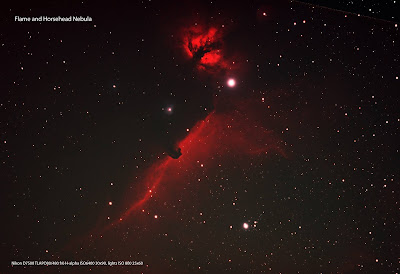My first object was orion nebula M42 with and without OIII filter. The images with OIII were succesfull but the lights without OIII failed due "trees".
The horsehead and flame nebula was observed with and withoud H-alpha. The images with H-alpha were succesfull but only 30min lights were taken in stead of 60.
Below picture : H-alpha 30x90s ISO6400 and lights 25x60s ISO800. Cameracontrol using DigiCamControl. Stacking with APP and final editing with CS4 and DeNoise AI.









